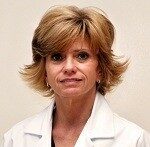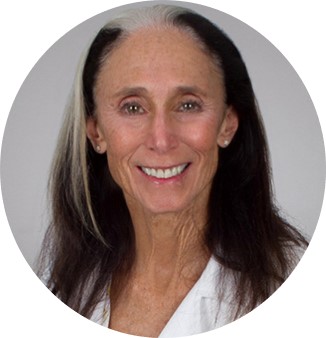touchEXPERT OPINIONS Getting personal: Individualizing therapy for cold agglutinin disease
Watch two experts give their perspectives on the recommended workup for a timely and accurate diagnosis, as well as the evolving treatment landscape, and the importance of individualizing therapy for patients with cold agglutinin disease.
Dr Catherine M Broome considers when to suspect CAD, and the steps needed to confirm a diagnosis, the impact of poor sample handling and delays to diagnosis, as well as the importance of real-world data in informing ongoing management of CAD.
1/2 Next InterviewIn this interview, Dr Catherine M Broome answers the following questions:
- What signs and symptoms should increase your clinical suspicion of cold agglutinin disease?
- What tests, and in what order, are recommended to diagnose primary cold agglutinin disease?
- How important is timing of tests and proper sample handling in obtaining accurate results?
- How do diagnostic delays impact treatment decisions and outcomes?
- Will longitudinal real-world data help to inform our understanding of the natural history of cold agglutinin disease?
Catherine M Broome, MD, is board certified in internal medicine, haematology and medical oncology. She has been on the staff at the MedStar Georgetown University Hospital’s Lombardi Comprehensive Cancer Center for 13 years.
A fascination with the science of haematology, and the opportunity to develop a strong relationship with patients and their families led Dr Broome to specialize in haematology and medical oncology. Dr Broome focuses on developing a partnership with her patients, providing them the most up-to-date information and treatment options. They work together to develop a treatment plan that fits medically, while also taking into account all aspects of the patient’s life.
In addition to patient care, Dr Broome is an associate professor in the Lombardi Cancer Center’s Department of Medicine. She also serves on the hospital’s safety committee.
Dr Catherine M Broome discloses Advisory board/panel fees from Alexion, Annexon Biosciences, Argenx, Incyte and Sanofi. Consultancy fees from Star Therapeutics.
Dr Ilene Weitz outlines the role of complement inhibitors as an alternative treatment option in the evolving treatment landscape of CAD, and how to use specific markers to tailor treatment for individual patients.
2/2 Take CE/CME TestIn this interview, Dr Ilene Ceil Weitz answers the following questions:
- How are complement inhibitors changing the current treatment paradigm for cold agglutinin disease?
- In terms of the evolving treatment landscape for cold agglutinin disease, when should clinicians consider the use of rituximab or sutimlimab?
- Are there any biomarkers or other factors to help tailor treatment to the individual patient?
- What indicators can be used to measure treatment response, and how can we measure the impact of cold agglutinin disease from a patient perspective?
Dr Weitz, MD, is a professor of clinical medicine in the Division of Hematology at Keck-USC School of Medicine.
Dr Weitz attended the Medical College of Pennsylvania, and did her internal medicine training at Cedars Sinai Medical Center in Los Angeles. She completed her haematology fellowship at Scripps Clinic and Research Foundation.
Dr Weitz’s research and clinical interests include: haemostasis thrombosis, complement disorders (including paroxysmal nocturnal haemoglobinuria, atypical haemolytic uremic syndrome and cold agglutinin disease), aplastic anaemia, iron metabolism, haemoglobinopathies (sickle cell and thalassaemia), mega platelet syndromes, and immune-mediated blood disorders.
She has published multiple original articles, reviews and chapters. Dr Weitz received the faculty teaching award from the University of Southern California, as well as Cedars Sinai Medical Center in the USA. She was honoured with the Morris Press Humanism award from Cedars Sinai Medical Center.
Dr Ilene Ceil Weitz discloses Advisory board/panel fees from Alexion, Apellis, Novartis and Sanofi. Speaker’s bureau fees from Alexion.
Overview & Learning Objectives
Overview
In this activity, US-based experts discuss best practice for diagnosing cold agglutinin disease (CAD) and how real-world data can inform our understanding of the natural history of the disease, as well as the current and emerging treatment options, and how we can use specific markers to tailor therapy and measure outcomes in patients with CAD.
This activity is jointly provided by USF Health and touchIME.
Target Audience
This activity has been designed to meet the educational needs of haematologists and haematologist-oncologists involved in the management of patients with cold agglutinin disease.
Disclosures
USF Health adheres to the Standards for Integrity and Independence in Accredited Continuing Education. All individuals in a position to influence content have disclosed to USF Health any financial relationship with an ineligible organization. USF Health has reviewed and mitigated all relevant financial relationships related to the content of the activity. The relevant financial relationships are listed below. All individuals not listed have no relevant financial relationships.
Faculty
Dr Catherine M Broome discloses: Advisory board/panel fees from Alexion, Annexon Biosciences, Argenx, Incyte and Sanofi. Consultancy fees from Star Therapeutics.
Dr Ilene Ceil Weitz discloses: Advisory board/panel fees from Alexion, Apellis, Novartis and Sanofi. Speaker’s bureau fees from Alexion.
Content reviewer
Caitlin Papa, APRN has no relevant financial relationships to disclose.
Touch Medical Directors
Kathy Day and Sadaf Kazi have no financial interests/relationships or affiliations in relation to this activity.
USF Health Office of Continuing Professional Development and touchIME staff have no financial interests/relationships or affiliations in relation to this activity.
Requirements for Successful Completion
In order to receive credit for this activity, participants must review the content and complete the post-test and evaluation form. Statements of credit are awarded upon successful completion of the post-test and evaluation form.
If you have questions regarding credit please contact cpdsupport@usf.edu.
Accreditations
Physicians
This activity has been planned and implemented in accordance with the accreditation requirements and policies of the Accreditation Council for Continuing Medical Education (ACCME) through a joint providership of USF Health and touchIME. USF Health is accredited by the ACCME to provide continuing medical education for physicians.
USF Health designates this enduring material for a maximum of 0.75 AMA PRA Category 1 CreditTM. Physicians should claim only the credit commensurate with the extent of their participation in the activity.
The European Union of Medical Specialists (UEMS) – European Accreditation Council for Continuing Medical Education (EACCME) has an agreement of mutual recognition of continuing medical education (CME) credit with the American Medical Association (AMA). European physicians interested in converting AMA PRA Category 1 CreditTM into European CME credit (ECMEC) should contact the UEMS (www.uems.eu).
Advanced Practice Providers
Physician Assistants may claim a maximum of 0.75 Category 1 credits for completing this activity. NCCPA accepts AMA PRA Category 1 CreditTM from organizations accredited by ACCME or a recognized state medical society.
The AANPCP accepts certificates of participation for educational activities approved for AMA PRA Category 1 CreditTM by ACCME-accredited providers. APRNs who participate will receive a certificate of completion commensurate with the extent of their participation.
Date of original release: 10 October 2022. Date credits expire: 10 October 2023.
If you have any questions regarding credit please contact cpdsupport@usf.edu.
Learning Objectives
After watching this activity, participants should be better able to:
- Outline strategies for the accurate diagnosis of cold agglutinin disease
- Evaluate the current and emerging treatment options for patients with cold agglutinin disease using the latest data
- Assess potential strategies for individualizing the treatment for patients with cold agglutinin disease

Register to touchONCOLOGY for FREE
- Peer-reviewed journals and expert opinions
- Interactive CME and e-learning modules
- Video conference highlights



